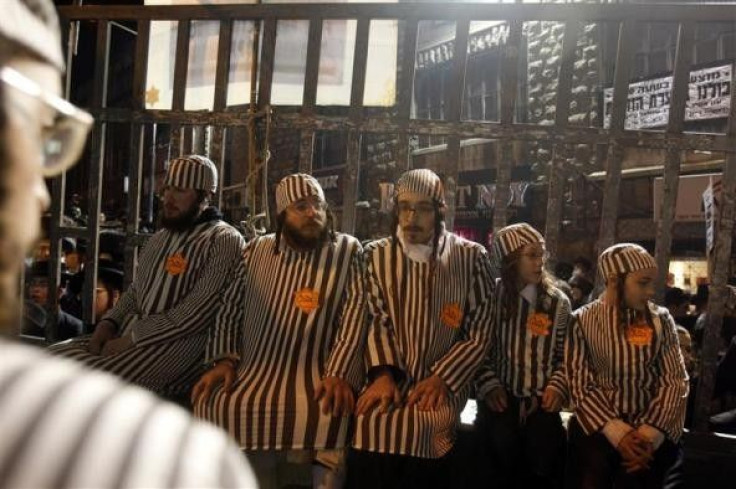Israel: 'Shocking' Holocaust Protest Sparks Ultra-Orthodox Fury

Ultra-Orthodox Jews dressed up as Holocaust prisoners in a protest against what they feel is the Israeli government's unjust persecution of the their conservative community.
Young children and their fathers affixed yellow Star of David patches with the word Jude, the German word for Jew, on them to their coats and others onto prison uniforms. Some sat inside a mock cage while young boy no older than six years old was shackled in handcuffs.
For the one thousand ultra-Orthodox who demonstrated in Jerusalem on Saturday night, the costumes were symbols equating the government and Israeli police to the Nazis. The generally far-right wing sect -- which makes up about 10 percent of the population in Israel -- has been under attack recently over its attempt to institutionalize segregation between men and women in public.
For most Israelis, the costumes were an abominable reminder of the atrocities that in part lead to the creation of the sovereign state of Israel itself.
“Prisoner uniforms and yellow patches with the word 'Jew' written on them in German are shocking and appalling,” Defense Minister Ehud Barak said in a statement.
“The use of yellow patches and small children raising their hands in surrender crosses a red line which the ultra-Orthodox leadership, who are largely responsible people, must not accept.
We must leave the Holocaust and its symbols outside the arguments in Israeli society, Moshe Zanbar, chairman of the main umbrella group for Holocaust survivors in Israel, told The Associated Press. This harms the memory of the Holocaust.
The separation of the sexes is traditional among the ultra-Orthodox faith. Boys and girls are separated in schools, often until they begin planning for marriage and some ultra-Orthodox newspapers won't print pictures of women.
But in some cities, the religious prescriptions are not welcome, especially now that some extreme ultra-Orthodox men are trying to push their beliefs on others. There have been reports that religious people using public buses have tried to force women into the back seats, as well as instances of men spitting and jeering at immodestly dressed women.
Still, the ultra-Orthodox community feels persecuted by the more-moderate Israeli majority.
The idea was to convey a clear and simple message: that wild incitement against the ultra-Orthodox community will not be tolerated, Rabbi Yitzhak Weiss, one of the organizers of Saturday's protest, told the AP. The Israeli media's incitement is reminiscent of the German media's before World War II.
While the protest is centered on the gender issue, the conflict between Israel's religious population and the more progressive majority is now decades old. In general, mainstream Israelis have come to resent the Orthodox and ultra-Orthodox communities, who try to push forward a religious agenda, are exempt from military service, spend time studying instead of working and are, occasionally, anti-Zionist.
© Copyright IBTimes 2024. All rights reserved.











